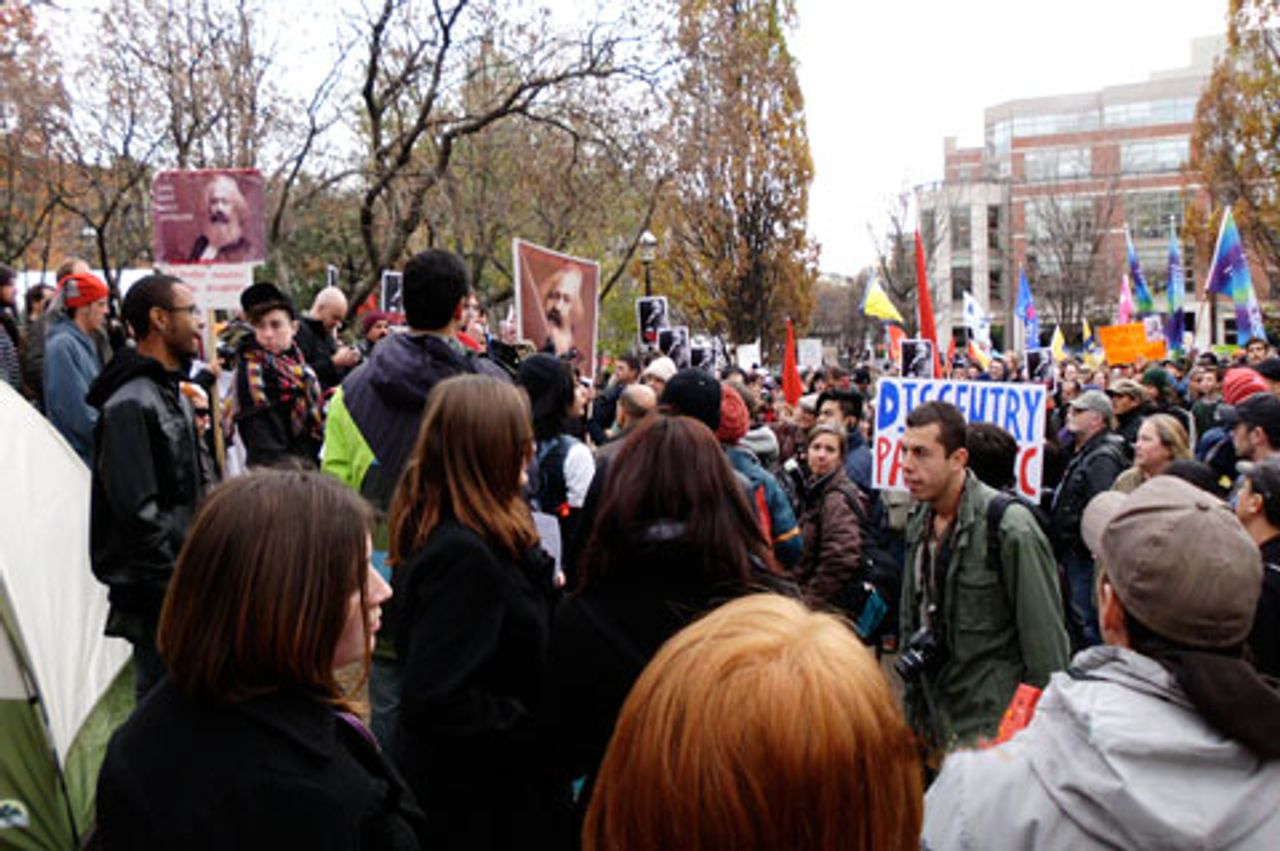 Occupy Toronto rally
Occupy Toronto rallyAbout 2,000 supporters of the Occupy Wall Street movement in Toronto marched from the protesters’ encampment in St. James Park to City Hall on Saturday. The demonstration was in response to efforts currently underway by the administration of right-wing mayor Rob Ford to evict several hundred people occupying the park. Ford has already garnered significant opposition from working people in Toronto for his agenda of privatizations, wholesale layoffs and massive cuts to social services.
Protesters in the crowd were quick to link these attacks with the move to curtail the democratic rights of the occupiers. Despite a “no politics” mantra promulgated by elements within the Occupy movement, the possibility of occupying threatened libraries, public housing units and workplaces was being raised on the march by a section of community activists and workers.
The “Evict Rob Ford” march comes on the heels of a concerted effort by municipal officials to shut down Occupy encampments across Canada. In the previous 10 days, police have moved in to evict protesters in Regina and Saskatoon, Saskatchewan, London, Ontario, and in Halifax, Nova Scotia, where 14 arrests were made. Police were poised Sunday night to remove scores of demonstrators in Edmonton, Alberta. In Victoria and Vancouver, British Columbia, orders enabling evictions in the coming week have been issued by the provincial court.
In Toronto, home of one of the largest encampments—about one hundred tents have been pitched in St. James Park—Ford initially moved to mobilize police for a mass eviction to occur last Tuesday night. But protesters succeeded in obtaining a “stay” to the city’s clearance order until a hearing could be held on Friday.
Arguments were to be heard before Superior Court Justice David Brown—a former Bay Street corporate lawyer and advocate for conservative social causes—with a verdict promised for the following day. However, in the wake of renewed resistance to police attacks on their right to protest in New York City and several other jurisdictions, and cognizant of the looming Toronto demonstration, Brown on Friday deferred delivery of his judgment until Monday morning.
Brown is no stranger to questions involving the containment of civil protest. Prior to the G20 meetings held in Toronto in June 2010—which resulted in the deployment of tear gas, pepper spray and plastic bullets, the brutalization of hundreds of demonstrators and 1,200 arrests—Brown had ruled that the police had every right to employ the use of dangerous and disruptive sound cannon on the streets of Toronto for “communication purposes.”
Susan Ursel, the lawyer representing the Occupy protesters in Superior Court, argued that the right to camp indefinitely to “redress inequalities in society” is protected by the Canadian Charter of Rights and Freedoms. This right to protest supersedes the demand by city authorities to enforce bylaws prohibiting overnight camping in municipal parks that they contend restricts the rights of others to use the facility.
The encampment tents, argued Ursel, were the “physical manifestation of the exercise of conscience.” In his questioning of Ursel, Brown appeared unsympathetic to her arguments. “Every protest group all of a sudden has its own park,” he said. “At the end of the day, where do I ride my bike?”
A World Socialist Web Site leaflet headlined “The Crackdown on the Occupy Movement and the Criminalization of Dissent” was circulated at the Toronto march. It argued that “the moves to shut down the Occupy movement are a clear demonstration of the indissoluble link between the fight for the social rights of working people and the defense of democratic rights. The expression of social and political opposition is increasingly incompatible with the structure of society in which a tiny financial aristocracy has enriched itself through the impoverishment of the vast majority.”
The leaflet continues, “The past decade has seen a steady erosion of democracy, particularly in the aftermath of the terrorist attacks of September 11. The most basic constitutional freedoms have been undermined as the government has asserted the power to spy on the population, arrest and detain people without charge, and carry out raids on political groups on the flimsiest of grounds. This has been accompanied by a vast expansion of the military-police-intelligence apparatus…
“The only social force capable of leading the fight against the political dominance of the financial elite and defending democratic rights is the working class. The fight against social inequality can find genuine expression only as an independent political movement of the working class that has as its aim the establishment of a workers government and the transformation of the economic system in the interests of social need rather than private profit—that is, on the basis of socialism.”
